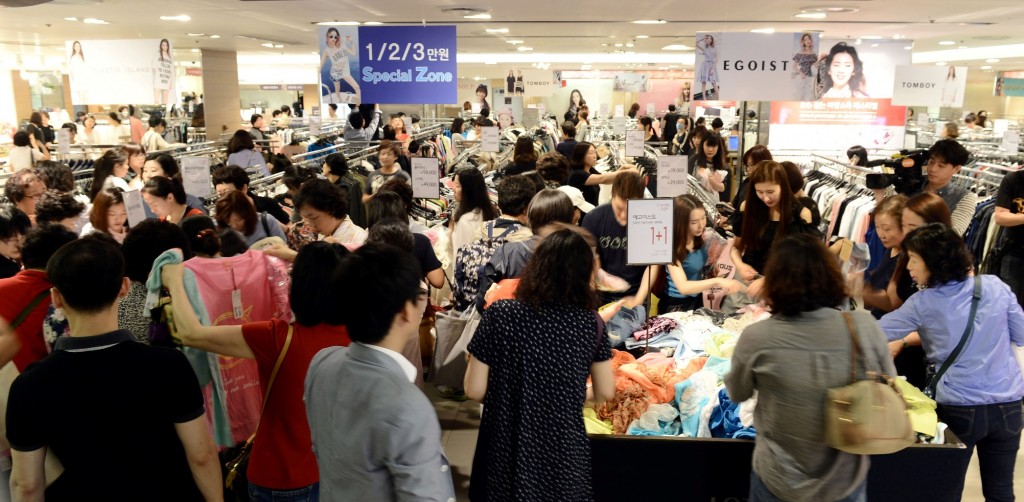- California Assembly OKs highest minimum wage in nation
- S. Korea unveils first graphic cigarette warnings
- US joins with South Korea, Japan in bid to deter North Korea
- LPGA golfer Chun In-gee finally back in action
- S. Korea won’t be top seed in final World Cup qualification round
- US men’s soccer misses 2nd straight Olympics
- US back on track in qualifying with 4-0 win over Guatemala
- High-intensity workout injuries spawn cottage industry
- CDC expands range of Zika mosquitoes into parts of Northeast
- Who knew? ‘The Walking Dead’ is helping families connect
S. Korea back to business as usual after MERS outbreak
By Choi Soohyang
SEOUL (Yonhap) — Kim Etty does not wear a surgical mask or bring disposable plastic gloves and hand sanitizer anymore when she goes to work as she feels it’s safe now to go around without them.
Those items were a must for the 29-year-old jewelry designer just weeks ago when an outbreak of a potentially deadly respiratory virus sparked widespread public panic across South Korea.
“In addition to a surgical mask, I used to wear a disposable sanitary plastic glove as I needed to push a button in an elevator,” Kim said in a calm voice.
She also said she even cleaned her hands with hand sanitizer after throwing away the glove.
“Now, I feel safe without wearing a surgical mask,” Kim said.
Kim’s case illustrates how South Koreans are getting back to business as usual by putting the health scare over Middle East Respiratory Syndrome behind them.
People have begun to flock to public places again, ranging from movie theaters to amusement parks, a sharp contrast to just a few weeks ago when they stayed at home out of concern they could contract the virus.
Medical experts said the virus can be transmitted through close contact with infected patients.
“I became desensitized to the MERS outbreak as time passed by,” Kim Hee-yeon, a 39-year-old violinist, said as she was getting ready to see a movie with her daughter, a primary school student, in a theater in Myeongdong, the bustling shopping district in central Seoul.
The number of moviegoers came to more than 2.29 million in the first weekend of July, up from 1.22 million in the same period last month, according to data released by the Korean Film Council.
More than 2,900 schools were closed on June 12 when the public panic reached its peak, but things have been back to normal at those schools since July 6, according to the Education Ministry.
Everland, a popular theme park run by South Korea’s No. 1 conglomerate Samsung Group, said the number of visitors stood at 68,000 in the first week of July, up 130 percent from the same period last month.
The Korea Baseball Organization also said 9,848 people on average came to a ballpark as of July 5, up from 8,249 people in June.
South Korea reported no additional MERS cases for a seventh consecutive day Sunday, a possible sign that the outbreak may be over.
Chung Eun-kyung, an official at the Korea Centers for Disease Control and Prevention, said discussions are under way among South Korean and foreign experts on when they can declare the end of the MERS outbreak.
Some hospitals, however, remain cautious about the virus.
Severance Hospital, a general hospital in western Seoul where no MERS patients have been treated, said it is still monitoring whether visitors have a fever through thermal sensors at the entrance of the hospital.
“We have no plan yet to pull out thermal sensors,” said Park Jin-seop, a spokesman of Severance Hospital.
The virus has killed 36 people since May 20 when South Korea reported its first case, sparking a widespread health scare across the country.
“I was scared after seeing news reports that a person tested positive for the virus dropped by a building I frequently visited for a breakfast,” Uhm Dong-hyun, a 23-year-old public worker said.
But now, he said he doesn’t wear a surgical mask anymore, a phenomenon shared by many people on the street.
No one was seen wearing a surgical mask at a crowded bus terminal or subway in southern Seoul recently, a sign that the public scare over the virus is over.
A pharmacist at the bus terminal, who identified himself only by his family name Ryu, said that he sold more than 500 surgical masks a day just a few weeks ago, but now he said sales have dropped to about 10 a day.
“I was worried about MERS before coming to Korea, but I was relieved to see Koreans here just normally living their lives, even without wearing masks,” Dang Quynh Nhu, a 26-year-old Vietnamese flight attendant, said as she was shopping in Myeongdong.
Myeongdong has long been one of the favorite places for foreign tourists, especially Chinese and Japanese.
Still, few Chinese and Japanese were seen in Myeongdong, underscoring lingering concerns abroad about the virus.
Kim Seung-tae, who runs a small eatery for dumplings in Myeongdong, complained that the number of customers has dropped since mid-June.
About 132,000 foreign tourists, mostly Chinese, canceled trips to South Korea due to the MERS outbreak in June, a move that officials said could hurt tourism, retail and other sectors.
Data of foreign tourists in June won’t be available until mid July.
Chinese officials have said they could explore ways to expand visits to South Korea by Chinese if Seoul declares the end of the MERS outbreak, Lee Boo-jin, CEO of Hotel Shilla, said earlier this month after a meeting with Chinese officials in Beijing.
“I came to South Korea after hearing news that there is nothing to worry about the MERS virus,” an ethnic Korean from China said as he waited for his friend at Seoul Station, South Korea’s largest rail hub. He identified himself only by his family name Kim.
















